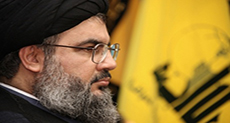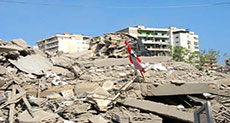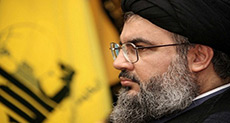
Hizbullah bastion rebuilds after war with “Israel”
Source: AFP, 10-09-2007
By Nayla Razzouk
BEIRUT - Watched over by guards, workers lay concrete blocks for brand new housing to replace Hizbullah`s former command quarters, destroyed by “Israeli” air strikes last year in Beirut`s southern suburbs.
A year after the devastating war between “Israel” and Lebanon`s Hizbullah guerrillas, the Shiite Muslim bastion has been turned into a vast construction site, criss-crossed by trucks carrying cement.
Visitors and even contractors are escorted to the building sites by Hizbullah`s "Indibat" (discipline) guards, wearing uniform camel fatigues and brown boots.
The guards, communicating with walkie-talkies, wear caps that say WAAD, meaning the pledge in Arabic.
WAAD is a project of Hizbullah`s reconstruction arm, Jihad al-Bina, to rebuild the teeming southern suburbs of Bierut where “Israeli” strikes destroyed or badly-damaged nearly 300 multi-storey buildings.
The project was named after the "truthful pledge," the name given by Hizbullah chief Hassan Nasrallah to the capture of two “Israeli” soldiers on July 12, 2006, in order to secure a prisoners` swap.
“Israel” responded the same day with a massive assault after which Nasrallah declared that his guerrillas` fierce resistance to the 34-day offensive was a "divine victory" over the Zionist state`s mighty army.
"WAAD is rebuilding 196 destroyed buildings, while the owners of 68 other destroyed buildings have decided to rebuild them themselves," WAAD director general Hassan Jashi told AFP.
He said "we chose 42 of the country`s best firms to carry out the reconstruction works. Works have already started in 75 buildings."
"Works should be complete by early 2009," vowed Jashi, sitting in his air-conditioned office, watching security camera footage of offices in the building and the street on a television screen.
WAAD spokesman Maher Assi added that "there will not be security perimeters anymore" in the southern suburbs where Hizbullah once kept areas off-limits to government forces despite criticism from political rivals.
"We don`t need security perimeters, we are all over the place now in Lebanon," he said.
Jashi said the southern suburbs -- buildings of shoddy construction towering over a labyrinth of narrow roads, with cars parked chaotically on the sidewalk -- will experience a major face-lift.
"We plan to have larger roads, lined with trees. We even bought lands to build public gardens, with underground parking lots. The buildings will be built to resist earthquakes and reduce noise."
In an apparent bid to maintain its power base, Hizbullah has granted families that lost property about 10,000 dollars each. Hizbullah has been evasive about the source of its funding but Iran is generally suspected as the main financial backer of the Shiite party.
As for the Lebanese government, Sanaa al-Jack, spokeswoman for its reconstruction projects, told AFP "the project costs 340 billion (Lebanese) pounds (227 million dollars), of which we have so far paid 141.34 billion pounds."
The government has granted citizens whose units had been completely destroyed about 53,000 dollars. Compensation for damaged property is assessed on a case by case basis.
"The process has been slow because originally many people did not have proper legal documents for their properties which were built illegally (!???), and some other people have lost their documents during the war (!??)" she said.
The government has only granted the checks to property owners in person, as it did not agree to give a party -- namely the opposition Hizbullah -- the compensation on their behalf.
WAAD director Jashi said "the ruling coalition is just creating hurdles because they think that if works are slowed down, people will be angry at Hizbullah. But it is the opposite that is happening."
Jashi also said the government was providing most of the funds necessary for the suburbs` rebuilding through assistance granted by Saudi Arabia and Kuwait, both of which are also funding similar rebuilding projects in southern Lebanon.
"There are other smaller donors, mostly from the private sector, but they do not like to be identified because (US President George W.) Bush keeps Hizbullah on his terrorism list," he said, with a sarcastic smile.
Iran has financed the rebuilding of several bridges in the Beirut surburbs, in addition to the restoration of a Maronite Catholic church also damaged by the “Israeli” strikes.
Project engineer Marwan Gharios, a 44-year-old resident of the Christian city of Byblos, north of the Lebanese capital, works for a company that was entrusted with the reconstruction of 33 buildings in the southern suburbs.
"I have no problems and we are all working together in harmony, Christians and Muslims," he said of his first project in the suburbs.
"And this is a good job opportunity for me, that allows me to earn a decent living for me and my family while staying in Lebanon despite the economic crisis," said Gharios, who had been contemplating a job offer in Dubai.
Gharios was standing at the edge of a deep site where workers were laying the foundations of a building to replace the once heavily-guarded Hizbullah secretariat general in Haret Hreik neighborhood.
"The US has destroyed and Jihad al-Bina is rebuilding," read a giant banner at the site.
Mohamad Shreif, an employee at the Central Bank of Lebanon, said he was living in an apartment which he had bought with a loan in Haret Hreik.
"I am living in debts, in a rented flat," he said on top of undergoing "three heart operations since the war."
Shreif`s house was also bombed by “Israel” during its invasion of Lebanon in 1982, at the height of the Lebanese civil war.
"But this time around we are getting compensation and we are keeping our heads high," he said, adding: "We lost our homes, but ‘Israel’ lost the war."



